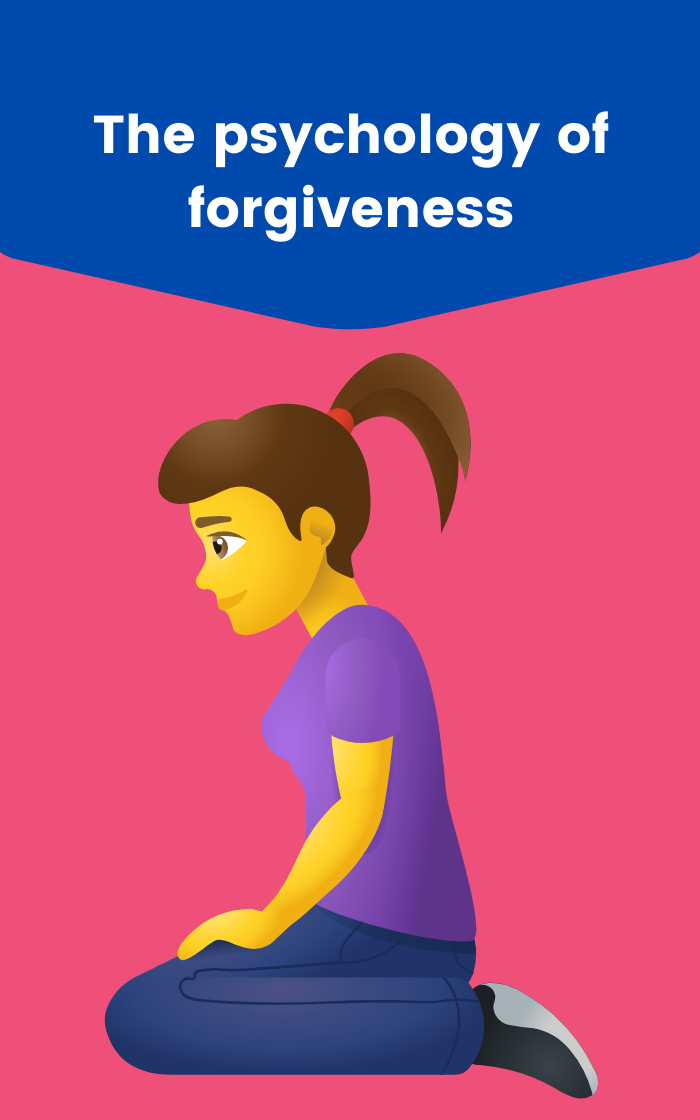The psychology of forgiveness

Parent Post
To begin forgiveness, you
To begin forgiveness, you need to take responsibility for how you feel. That is a three-step process:
- Dust off your remote control and practise being thankful.
- Focus on your breath.
- Focus on a time when you experienced intense feelings of love or a peaceful scene.
Empathy and compassionEmpathy and
Empathy and compassion
Empathy and compassion help you feel what another is experiencing and can be incredibly helpful on the path to forgiveness.
While empathy is powerful at understanding the pain of another, compassion encourages you to take action needed to reduce that suffering.
Forgiveness is a process. And
Forgiveness is a process.
And while the duration and difficulty will vary significantly, it can be equally applied to all levels of pain – whether it’s the result of someone being rude to us in a store, a life cut short, or a partner cheating.
Emotional regulationIt helps you
Emotional regulation
It helps you manage your emotions and avoid “hijacking” your amygdala – the part of the brain responsible for initiating your fight or flight reaction.
You cannot suppress negative emotions. And if it appears you have, your limbic system tells a different story and remains highly active.
Instead, it is better to become aware of your emotions, recognize and label them, and interrupt and calm your response.
Positive psychology researchLearning to
Positive psychology research
Learning to forgive is vital for both our mental and physical wellbeing. Forgiveness can be learned and used in many different contexts, including:
- Children of neglectful parents
- Older people experiencing lack of care
- Women abused as children
- People whose partners were unfaithful
Shifting perspectivesThis can help
Shifting perspectives
This can help you stand back and observe your thoughts, feelings, and bodily sensations. You cease to be a slave to your selfish narrative.
Observing anger is not the same as being angry. Mindfulness practices can provide a practical path to shifting your perspective and seeing that your experiences do not define who you are.
Radical responsibilityThis requires being
Radical responsibility
This requires being accountable for yourself, owning your actions, feelings, thoughts, and behavior.
Rather than reacting with fear, running away, or denying you have any power over what is happening, you must take action to avoid recurring, harmful behavior.
You must recognize behaviors that are unhealthy – without judgment – and take responsibility.
Studies found that even
Studies found that even thinking about forgiving an offender improved people’s cardiovascular and nervous system.
By mentally switching between thoughts of goodwill and holding a grudge, blood pressure, heart rate, and muscle tension increased, while feelings of control reduced.
The mental benefits of forgiveness training – including increased optimism, self-confidence, compassion, reduced stress, and spiritual inclinations – were still present six months after training.
5 skills of forgivenessAcceptanceAcceptance
5 skills of forgiveness
Acceptance
Acceptance is not about defeat or resignation; it is about accepting what has happened.
Acceptance shifts the balance. Your view of what is happening alters. You “separate the pain that is inevitable from the suffering that is optional.”
To forgive, you must accept the past. That is not to say you like it or that it was within your power to stop it, but it has happened – and cannot be undone.

